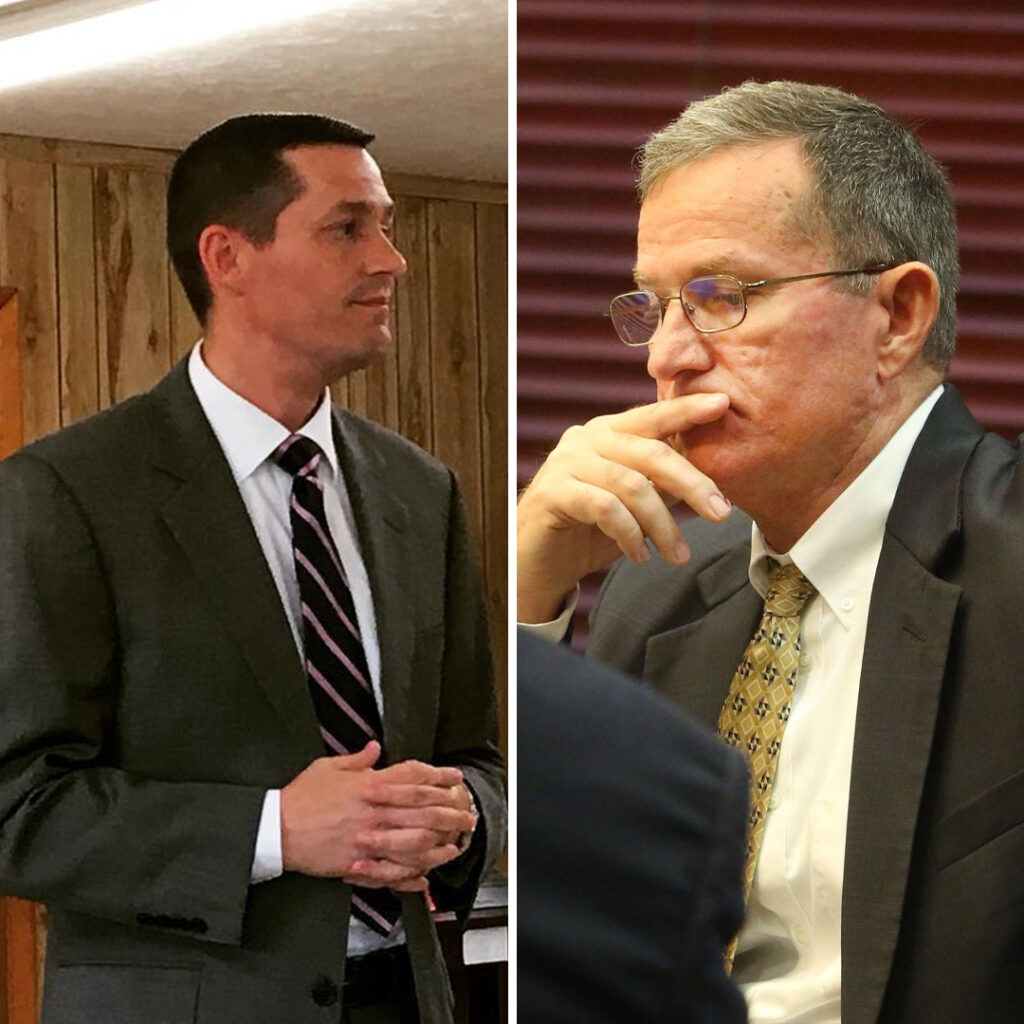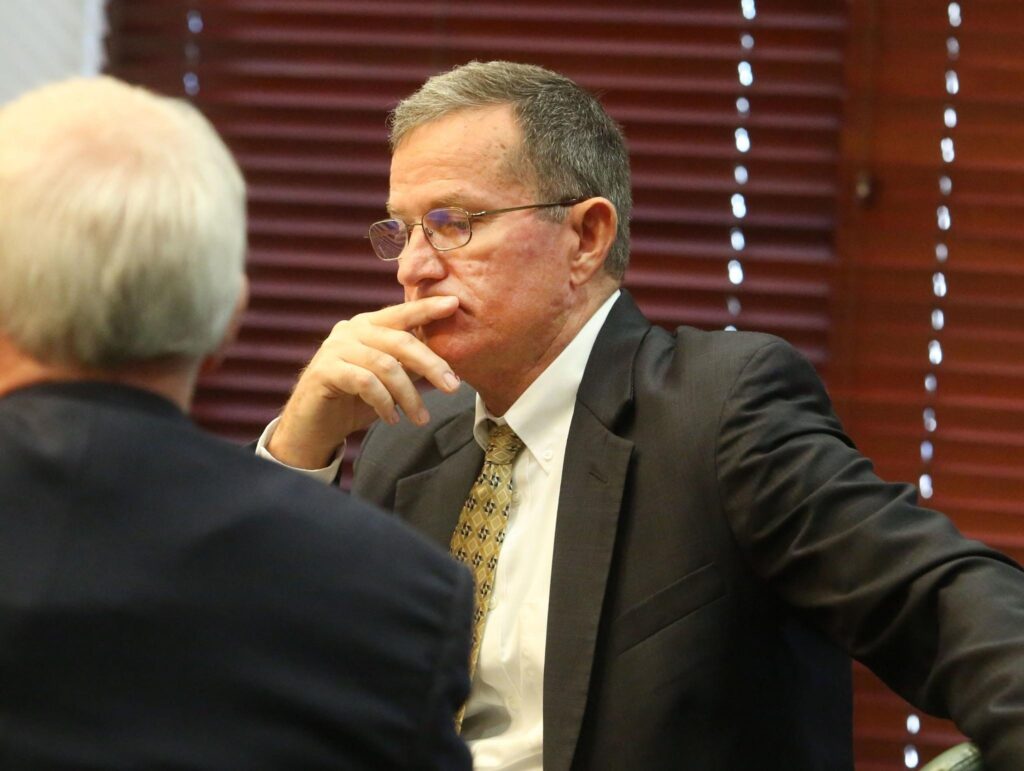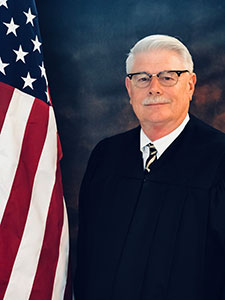Tale of a turf war

The Florida Supreme Court recently reprimanded former Marion County Assistant State Attorney Bryon Aven for engaging in professional misconduct while running for Marion County judge in 2018.
In an order dated May 27, the court found Aven – who recently resigned from the 5th Circuit State Attorney’s Office – guilty of violating several Florida Bar rules and judicial canons for falsely and dishonestly attacking the integrity of his opponent, Judge Robert Landt. The 5th Judicial Circuit is comprised of Citrus, Hernando, Lake, Marion, and Sumter Counties, with the main administrative offices in Ocala.
The order contained two dissenting opinions by Justices Charles Canady and Jorge Labarga. Both felt Aven deserved more than a reprimand.
Justice Canady’s short, one-paragraph opinion stated that a “non-rehabilitative suspension” of Aven would have been more appropriate than a public reprimand.
In contrast, Justice Labarga’s dissenting opinion was more than 10 pages long. It characterized Aven’s judicial campaign tactics as “win-at-all-costs-and-pay-the-fine later” by “expressly and intentionally implying” that Judge Landt “favored criminals, disfavored law enforcement, disfavored the state attorney,” and that if elected Aven would do differently.
What the justices agreed on, however, was that the order should serve as a warning to future candidates that the court “takes misrepresentations that cast a sitting judge in a false light seriously because of their potential to undermine confidence in the rule of law.”
Pointing to other instances where the court removed elected judges for campaign-related misconduct, they issued the warning to future candidates that similar misconduct would be met with more severe sanctions.
At the time he was running for judge, Aven worked as a prosecutor for State Attorney Brad King, who had vocally and publicly criticized Landt’s handling of criminal cases. While King seemingly escaped sanctions for Aven’s conduct during the campaign, a key official in the investigation concluded that the campaign rhetoric was undoubtedly influenced by King’s long-running feud with Landt.
The judicial election that sprang from a turf war
Judge Landt was elected a Marion County judge in 2012 after a 25-year career in private practice, handling primarily civil litigation. Of the four Marion County judges, he was the only one who had not worked as a state attorney before becoming a judge.

Brad King [Red Huber/Orlando Sentinel]
By the summer of 2013, conflicts began between Landt and King.
Less than a year later, on April 17, 2014, King wrote to the Judicial Qualifications Commission (JQC) to accuse Landt of making inappropriate comments from the bench.
King would follow up with two additional letters containing similar accusations against Landt in June of 2014.
One of the allegations raised by King was Landt’s handling of a criminal case, State of Florida v. Emanuel Brooks. According to a memorandum by the then-Assistant State Attorney Jennifer Bass, Landt dismissed the case based on Brooks being “clearly incompetent.”
On May 29, 2014, King filed a motion for Landt to recuse himself from Brooks’ case. Less than a week later, Landt issued an order defending his decision to dismiss Brooks’ case. He pointed to witness testimony that Brooks had Alzheimer’s disease, along with inconsistencies in law enforcement affidavits, and he noted that no one wanted to pay for an evaluation of Brooks so that it could be determined if he was competent to participate in his defense.
The last paragraph of the order read, “Based on the foregoing, the Court finds that the State’s Motion to Disqualify is spurious, baseless and devoid of either factual or legal merit. However, the Court acknowledges that many people’s fears are neither rational nor based on fact, and therefore, in the interest of judicial harmony, the Court hereby recuses itself from this matter and requests that Administrative County Court Judge Jim McCune reassign this case to another, preferably less fear-inspiring, judge.”
McCune did reassign the case and also reassigned Judge Landt from the criminal docket to the civil, non-criminal, docket while the JQC reviewed King’s claims.
When asked recently whether the public should view judicial re-assignments as punishment or proof of wrongdoing, Judge McCune stated “Administrative Orders aren’t about discipline; they are for creating efficient court dockets.“
Jeffery K. Fuller, Chief Deputy Court Administrator for the 5th Circuit, concurred with McCune’s statement and added, “The Chief Judge is not authorized to discipline any judge. Article V, Section 12 of Florida Constitution sets the Florida Supreme Court and the JQC as the mechanism to ‘investigate and recommend the discipline of a justice or judge whose conduct, during term of office…warrants…discipline.’”
On Sept. 15, 2014, the JQC wrote a letter to King indicating that the commission had investigated his allegations against Landt and closed the matter. Discussions from that commission investigation are confidential under the Florida Constitution and would have become public only if probable cause was found and formal charges were filed.
In 2015, court administration again considered splitting the criminal cases between all four county judges, including Landt. King objected again. But by Jan. 1, 2016, Landt resumed handling criminal cases, and the discord between Landt and the State Attorney’s Office resumed.
On March 22, 2018, Aven filed to run against Landt.
Aven began working under King at the state attorney’s office in 2007, right out of law school.
The crux of Aven’s campaign website messaging, which would later result in the reprimand, implied Landt was too lenient and not pro-law enforcement.
Aven’s campaign website tab entitled “My Opponent” included numerous links to content that painted Landt as derelict in his rulings and soft on crime, according to the investigation.
They included such headlines as: Promise Made, Promise Kept?, Most Reversals, Constitutional Violations, and Inappropriate Language.
On July 12, 2018, King sent a memo to Judge McCune and all county court judges indicating that he would be reducing staff to the dockets of Judges Landt and Thomas Thompson.
“I have determined that there are two dockets where the results of prosecutions produce substantially less benefit for the citizens of Marion County. Accordingly, I will further reduce the staff allocated to those dockets,” King wrote.
Five days later, with a little more than a month before the election, King delivered to Administrative Judge Anthony Tatti a motion to disqualify Landt from all criminal and criminal traffic cases in Marion County.
In the motion, King stated there was a “long history of animosity” between Landt and the state attorney’s office. The motion listed all the previous allegations made by King in 2014 about Landt, including sexist remarks and the Brooks case.
The only new issue in the motion was Judge Landt’s comments at an election forum on July 9, 2018:
“In criminal court, in last three years, I have suppressed cases. A suppression hearing is where a person comes to court and says, ‘Judge I don’t think they should be able to use this evidence against me because my constitutional rights were violated when the evidence was collected.’
And what I have done in many instances is suppress these cases because I find the constitutional right has been violated. And what’s happened is the state has appealed those cases. They’re no-brainers. They all come back affirmed.
And as a State Attorney, you have two options at that point. You can train your people to stop trying cases where people’s constitutional rights have been violated, or you can run somebody to get rid of the judge because you want to continue to prosecute cases where people’s constitutional rights have been violated.

Bryon Aven [Submitted]
Ladies and Gentlemen, that is why we’re here today. The State Attorney’s Office has fought Misdemeanor Drug Court. They fought Veteran’s Court. And now they are trying to get rid of the judges who brought those things [diversion courts] to our community, and it [diversion court] is not what our State Attorney wants.”
The same day King filed the motion, Judge Sue Robbins issued an administrative order reassigning Judge Landt to only a civil docket. Judge Landt was not given the opportunity to see the motion or respond to it before the order was entered.
But almost as soon as Judge Robbins reassigned Landt, Aven posted King’s motion and Robbins’ order to support his campaign’s claims that Landt was not favorable to law enforcement or prosecutors and that he had been removed from the criminal docket as a result.
Months later, after the election, Landt returned to handling criminal cases and King’s motion was denied by Judge Robbins.
But on Aug. 16, 2018, just weeks before the election, King sent an email to every judge and attorney in Marion County restating claims that Judge Landt made inappropriate comments to female court personnel and expressed concerns about “Judge Landt’s bias against the assistant state attorneys.” He claimed the bias would only increase due to King’s reports about Landt’s conduct.
Three days later, the Ocala Star-Banner printed King’s allegations against Landt in an open letter to the editor, followed by Landt’s rebuttal two days later.
“Mr. King continuously complains that I am biased against him, but the real problem Mr. King has with me is that I am not biased FOR him. There is a significant distinction. I swore an oath to uphold and defend the Constitution and I will continue to do so every day as your County Judge. No amount of coordinated attacks, misleading information, or dirty politics will ever change my commitment to that oath or my commitment to this community,” Landt stated in his printed statement.
The complaint against Aven
On Aug. 18, 2018, Scott Schmidt, a Gainesville attorney, filed a Florida Bar complaint against Aven.
While Aven lost the election to Landt by 13,263 votes, the complaint continued. The Florida Bar assigned the matter to a grievance committee in the 18th Judicial Circuit, chaired by Stacy S. Salmons, the chief assistant to Phil Archer, the 18th Circuit’s state attorney.
On May 23, 2019, as part of the investigation, Salmons and Florida Bar Attorney Laura N. Gryb deposed Aven.
The attorneys asked about King’s involvement in Aven’s campaign, to which Aven testified that he told King a few days before filing that he would run against Landt and sought his advice on what seemed to be minor issues such as the colors of Aven’s campaign yard signs.
At the end of the sworn statement, Salmons asked Aven, “Do you have a mea culpa? Is there anything else you want to tell us now that we’ve talked and talked and talked and we’ve heard what you wanted to present in your defense about what the intent was behind the website?”
Aven replied, “Am I sorry? Yes, I am. Would I have done things differently? Now, yes, I would have. Was it ever my express or implied goal to show that I was pro-law-enforcement, he was not, that I was going to be tough and he was not? No. Could it have been taken? Yes.”
Salmons asked if Aven ever planned to run for public office again.
“I have no idea,” Aven replied. “I’m not a politician. But, you know, possibly.”
The grievance committee later reported to the Florida Bar that it found probable cause for the charges against Aven.
On Nov. 19, 2019, the Florida Bar filed its formal complaint against Aven on the basis that he “attempted to impugn Judge Landt’s integrity, citing his record in criminal cases presided over,” while repeatedly implying that Judge Landt was biased against the state attorney and Aven was the candidate that was in favor of law enforcement and the state prosecutor’s office.

Judge Robert Landt [Submitted]
Circuit Judge Craig C. DeThomasis was appointed as referee to hear the evidence by the Supreme Court in Aven’s disciplinary action.
Aven hired Tampa attorney Scott Tozian.
Emails obtained through a public records request show that King came to Aven’s defense. In one email to Aven’s attorney dated Jan. 21, 2020, King shared a draft letter with his thoughts about James Vickaryous, who was overseeing the investigation for the Florida Bar:
“I prepared these as a letter but can deliver them by phone. If any of it is a problem or you want something else included, let me know. Phil Archer says that he knows Mr. Vickaryous. Says he is a law-and-order guy who has supported him in the past. Ms. Salmons is Phil’s chief assistant.”
The draft letter addressed to Vickaryous and Salmons, recounted allegations made previously by King about Judge Landt, acknowledged the rift between them, but also offered his opinion that Aven’s conduct did not warrant the penalties sought by the Bar.
“…having watched nearly 40 years of judicial races and judicial conduct, the allegations made against Bryon do not warrant a finding of misconduct with the ramifications of that finding to his professional reputation. I doubt seriously that Bryon will engage in any type of election, judicial or otherwise, and this type of mark on his record is not in keeping with his conduct,” the draft read
On Feb. 11, 2020, King emailed Tozian:
“I spoke to Mr. Vickaryous again. One of Bar concerns is if there is diversion and Bryon runs again, there will be no public record of result of complaint. I told them I doubt seriously that he would. If Vickaryous heard that from you, it could be a factor. You can call for more detail.”
Emails between Aven’s attorney and Gryb, the attorney representing the Florida Bar, reflect attempts to have Aven put in a diversion program instead of harsher sanctions. But those attempts were unsuccessful. Gryb later confirmed to Tozian that even Vickaryous “agrees that diversion is not appropriate in this case.”
The final hearings before the referee were held on Aug. 11, 2020, and Sept. 2, 2020. At the time of the hearings, Aven and the Florida Bar had stipulated to facts and offered a consent judgment for the referee’s consideration.
Several members of the local judiciary and law enforcement were subpoenaed by Aven’s attorney to offer mitigating testimony, including Judge Roberto Arias, Judge Steven Rogers, Judge Hale Stancil, Chief Mike McQuaig, Robert Graham and Judge Brian Lambert.
The referee found that most of the witnesses did not have firsthand knowledge of the website content and offered only mitigation testimony.
According to the referee’s recommendation to the court, “The evidence presented is clear and convincing to establish that the respondent expressly and intentionally implied that the incumbent judge favored criminals, disfavored law enforcement, disfavored the state attorney, that he, as a candidate, would do differently.
It was a calculated tactical decision to send a message crafted in a subtle yet improper manner that communicated to voters and in an emotional and visceral reaction played upon public perceptions of justice contrary to the rules regulating The Florida Bar and the canons of judicial conduct.”
Brad King’s role in the turf war
At the Sept. 2, 2020, hearing, while reflecting on the witness testimony, the referee had pointed comments about King’s influence on Aven’s campaign tactics.
“..what flows out from this is that it’s clear to any objective, dispassionate observer that State Attorney King had an ongoing dispute with the judiciary, and the branches of government in the Fifth Circuit were at odds, specifically with regards to Judge Landt’s rulings, which then became part and parcel of this campaign and the controversy and investigation that led us here today,” according to the referee.
“…State Attorney King, disregards the concept of a judicial campaign not being a political campaign and is of little value except that it does explain the environment in which Mr. Aven got dragged into the rift between the office he worked at and worked – and the state attorney he worked for, and the incumbent judge who was the opposing candidate in this particular race,” he continued.
The referee gave weight to Aven’s counsel raising the turf war as a mitigating circumstance at the Aug. 11, 2020, hearing:
“His counsel appropriately argued and pointed out something that was pretty obvious, and, and I think the argument needed to be advanced, that Mr. Aven got caught up – I think the words were used – in the vortex of a turf battle between the executive branch of government, who he worked for and represented in the Fifth Circuit, and the opposing incumbent county court judge.
“But that just explains why Mr. Aven is now in this position,” the referee continued. “It doesn’t change the fact that he failed to rise above the fray and keep himself out of that vortex of rift or fit or dispute. It was he individually that fell short of meeting the challenge of adhering to the rules and to the canons.”
While King was the State Attorney for the 5th Circuit, the Florida Bar and Florida Supreme Court had no authority over him because he was a constitutional officer.
Asked about his role in Aven’s campaign, King said he did not encourage Aven to run against Landt, didn’t endorse him and didn’t contribute to his campaign.
“I’ve actually been a lot more involved in other judicial campaigns than Aven’s,” he said.
King also said his decision to publish his complaints against Landt in the Star-Banner before the election was not an attempt to bolster Aven’s chances.
“(They) were either budgetary or reactionary to the newspaper articles and the statement made by Landt about my office. Landt’s statements about my office were worse than what Bryon said (about Landt),” King said.
Asked about the referee’s assessment that Aven got caught up in a turf war between the state attorney’s office and Judge Landt, King said, the feud made the campaign more charged but that it was not his intention to impact Aven’s campaign specifically. He said he was just reacting to the circumstances.
When asked about his recollection of the election, Judge McCune said, “I was chairing the canvassing board for the 2018 election that included three of my colleagues. I deliberately did not read any of the news reporting and avoided conversations about the election to help maintain my integrity as canvassing chair.”
And while that might sound like no easy task, McCune said, “For judges and lawyers to perform their duties ethically, they are constantly having to discipline their thoughts and compartmentalize information in order to maintain independent thinking.”
Aven following the campaign
Aven continued to serve as an assistant state attorney under King after the election.
King announced he would not seek re-election in 2020 on the last day to qualify for the seat. The same day, Assistant State Attorney Bill Gladson filed to run. Gladson was unopposed and took office on Jan. 1.
A review of Aven’s employment record with the State Attorney’s office found no mention of the Florida Bar disciplinary action other than containing a copy of the original complaint filed by the Florida Bar against Aven with handwritten notes that seemed to reference deadlines for responding to the complaint, status conference, hearings and trial.
Walter Forgie, spokesperson for the state attorney’s office said that the “State Attorney’s office did not maintain a file monitoring the Florida Bar Case against Mr. Aven.”
Employment records reflect multiple memos by Cindy Harper dated Feb. 25, 2019, and March 14, 2019, alerting supervisor Toby Hunt about Aven’s mishandling of cases and unexplained absences. Toby Hunt ended an email regarding Ms. Harper’s memos with this note:
“NOT IN THE NOTES TO FILE section: As ASA Aven is already on thin ice, I would have terminated him for this particular decision, but given my current staffing concerns, I explained to ASA Aven my grave disappointment in his handling of both of the above issues. I also expressed my continued frustration with his actions, including his repeated request to be allowed to leave early every day, which I got SA King to approve, but then declined it after I had expended the energy and time to make this happen- just one further example of how his behavior is antithetical to the actions we wish our senior ASA’s to perform.”
On April 10, Aven submitted his resignation in an email to State Attorney Gladson.
There had been conjecture his resignation was related to a mistrial just two days earlier, after Aven played a 911 call to the jury that included statements the judge had previously ruled would not be admissible.
Forgie confirmed Aven resigned in lieu of termination for a pattern of behavior that fell short of the expectations.
Aven’s last day of employment for the 5th Circuit was April 9, and Aven was approved to receive 25% of the 336 hours of sick leave and 356 hours of annual leave he had accrued. His base salary was $6,695 a month.
Aven is now working as an assistant state attorney in the 18th Circuit, which covers Brevard and Seminole Counties, under Phil Archer.





